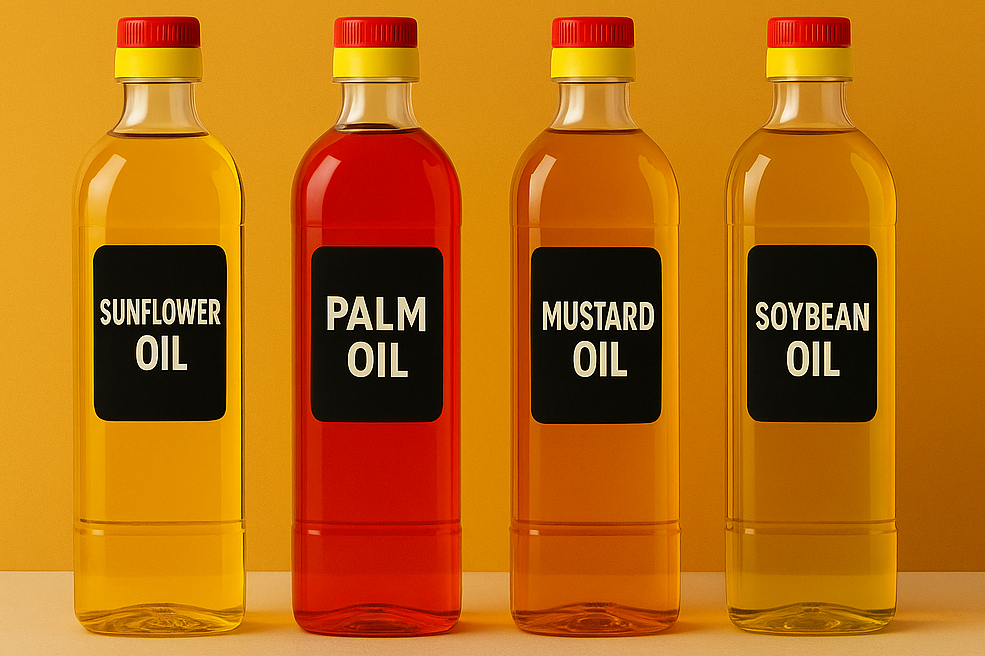
Table of Contents
Bulk Edible Oil Suppliers: What B2B Buyers Need to Know
Introduction: More Than Just Oil
In my years of working with food businesses, one thing is clear—choosing the right bulk edible oil supplier isn’t just about cost. It’s about consistency, quality, and the ability to scale.
Whether you’re running a restaurant chain, manufacturing snacks, or exporting food products, oils like palm, sunflower, soybean, and mustard are the lifeblood of operations. But finding the right supplier? That’s where the real work begins.
Why Bulk Edible Oil Suppliers Matter
Buying in bulk is the obvious choice for B2B operations. Here’s why:
- Lower costs per litre
- Reliable quality that doesn’t vary from batch to batch
- Flexible packaging (barrels, jerry cans, pouches)
- Efficient logistics to keep up with demand
- Working with a trusted supplier simplifies everything—from procurement to production.
Popular Oils for B2B Buyers
Here’s a quick guide to the big four oils in the bulk market:
🌴 Palm Oil
- Uses: Bakery, snacks, processed foods
- Why it’s used: Affordable, shelf-stable, great for deep frying
🌻 Sunflower Oil
- Uses: Restaurant cooking, salad dressings
- Why it’s used: Light flavour, high smoke point, heart-friendly
🌱 Soybean Oil
- Uses: Institutional kitchens, sauces, industrial frying
- Why it’s used: High in omega-3, neutral taste, versatile
🌾 Mustard Oil
- Uses: Indian cooking, pickles, traditional dishes
- Why it’s used: Strong aroma, cultural appeal, antibacterial properties
Each oil has its own strengths, and your supplier should help you choose the right fit based on your business needs.
What to Look for in a Bulk Supplier
From experience, these five factors separate a good supplier from a risky one:
- Certifications: FSSAI, ISO, HACCP, Halal, Organic
- Packaging flexibility: From 15L tins to 200L drums
- Strong delivery network: For consistent, timely supply
- Product consistency: Especially important for sensitive oils like mustard
- Support: A responsive team makes life easier
Private Label Options
Looking to build your own brand? Many suppliers offer private label or OEM services, letting you:
- Repackage oils under your own name.
- Customise labels and packaging.
- Enter the market without owning production.
- Perfect for traders, exporters, or retailers.
Red Flags to Avoid
Don’t fall for low prices without due diligence. Watch out for:
- Missing certifications
- Vague pricing or contracts
- Poor communication
- Lack of transparency in sourcing
- A bad supplier can cost you more in delays and reputation than any upfront savings.
Who Uses These Oils?
- Restaurants: Prefer soybean or sunflower for neutral flavour
- Snack brands: Rely on palm for stability
- Exporters Often choose mustard and soybeans for demand abroad
- Institutions: Need affordable, large-quantity oils like palm
Where the Market’s Headed
The B2B oil supply scene is evolving. Trends I’m seeing include:
- Growth in cold-pressed and organic oils
- Focus on traceable sourcing.
- Eco-friendly recyclable packaging
- Impact from global price fluctuations
A future-ready supplier will adapt and guide you through these changes.
Conclusion
Your edible oil supplier isn’t just another vendor—they’re a strategic partner. Whether you’re buying palm, sunflower, soybean, or mustard oil, choosing the right bulk edible oil supplier ensures your products stay consistent, compliant, and cost-effective.
Need a reliable supplier for your business? Let’s connect and find the perfect oil solution for your industry.

